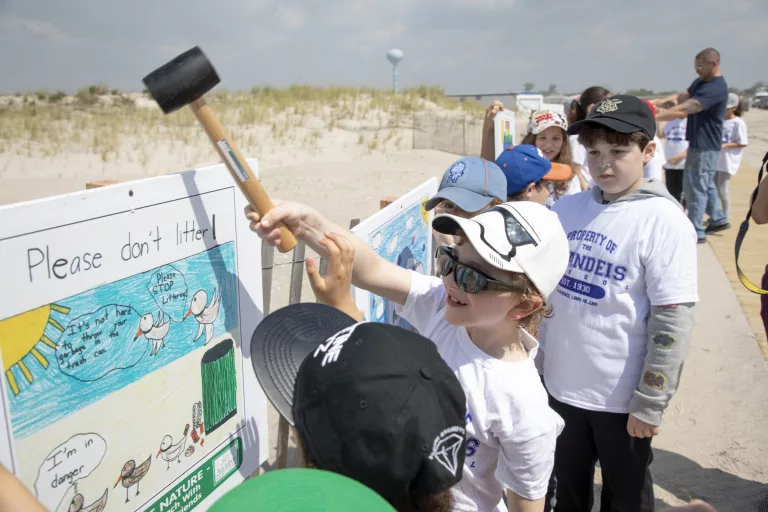

By: Georgette Harrison
My toddler doesn’t usually have separation anxiety, but a few months ago, he arrived to the classroom he knows and loves, and clung on to me for dear life, crying. His favorite teacher approached him and tried to coax him with a toy, to no avail. Disconcerted by this turn of events, I gave him lots of hugs, but alternated the hugs with gentle nudges off my lap. We tried to distract him, dangled different toys in front of him while ooh-ing and aah-ing, sung songs, but he continued to cry and hold on to my neck. One of his friends, a little girl around 20 months of age, watched as we tried to comfort him. She ran to his cubby, grabbed my son’s lovey, brought it over and gave it to him. She sat down right next to him, and began patting him on the leg. My son sighed a deep sigh, stopped crying and we all sat in silence until he recovered. He was then ready to go play with his little friend.
I’ve reflected many times on this day and thought about Cori Doerrfeld’s book “The Rabbit Listened.” In the story, little Taylor works hard on a project, a labor of love, when something happens that destroys it. Different animals come by, well-intentioned, hoping to help. They encourage him to talk, to scream, to forget about it, pretend it never happened, fix it. But Taylor isn’t ready to do any of these things and the animals, unsure of how to help, leave him. Until the rabbit comes by, sits next to him, and listens as Taylor tries to make sense of what just happened. I often think about that rabbit as a good example of a good-enough parent, a parent who can sit with their child and tolerate all the feelings in the room.
Sitting with children when they’re crying and in pain is not an easy thing to do, though. Even for rabbits (and apparently child therapists).
I once treated a very insightful patient who told me “When I start to feel nervous, overwhelmed, it’s like the train has left the station. My parents try to help, but they tell me to breathe, or think about something positive. All the words overwhelm me. I just need to wait for the train to run its course and wait to see the light at the end of the tunnel. What I need is for someone to hang out with me so that I don’t feel like it’ll be a runaway train.”
Hearing a child cry and not do everything we possibly can to take the pain away seem counterintuitive, even from an evolutionary standpoint. We can all imagine the importance of keeping our offspring quiet in order to keep predators from finding us. But nowadays, the feeling of anxiety when our children cry is not based on the fear that it’ll attract a sabre-toothed tiger. Instead, the feeling of anxiety and threat comes from within us. The call is coming from inside the house, so to speak. For one parent, it might remind them of the times that their own childhood pain and anger meant being reprimanded by their parents. For another parent, it might remind them of the promise they made themselves to never let their child feel pain the way they did as children. For every parent, there will be a different meaning.
To be able to listen like rabbits, we need to shift the way we think about our role as parents in those moments. Our job as good-enough parents is not to take away the feelings; it’s to help our children feel like the emotional train won’t be a runaway train, and that they don’t need to take that ride alone. When we try to take away the feelings as quickly as possible, we risk sending the implicit message that those feelings are dangerous, and must be done away with in order to return to safety. Our children might also interpret our attempts to make things better as attempts to do away with their feelings because we can’t tolerate them (and sometimes they might be right).
Next time your child is sad, angry, frustrated, sit with your child (regardless of age). Listen like a rabbit, not judging, not fixing, not saying anything other than the occasional “I’m right here, you’re not alone.” Notice your natural compulsion to try to fix or distract, and think of the acronym W.A.I.T. Why Am I Talking? Most of the time, our desire to fix or distract comes from a place of our own discomfort with the situation. In those moments, think about where that discomfort comes from. What keeps you from just being present, holding, and waiting for that train to get to the other side?
My son’s little friend knew to do what the grownups, in our anxiety and desire to make my son feel better, forgot. In the throes of distress, we don’t need to be sung to or distracted. When we’re in pain, scared, feeling alone, what we need is for someone to sit with us, hold us, with no rush to get us moving away from the pain. As good-enough parents, we can strive to remember to listen like rabbits, and stay with our children until the train arrives to the next station.
If your child experiences a lot of runaway emotional trains, or if you’re finding it hard to listen like a rabbit, there’s support for your family. Don’t hesitate to call the Child Guidance Center of Southern CT at 203-324-6127 for assistance.





